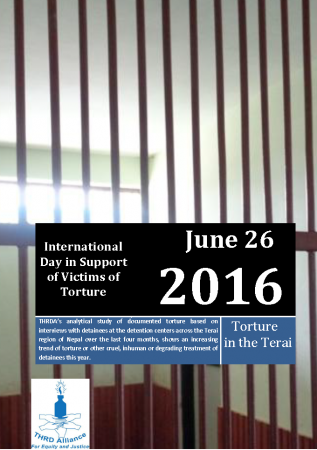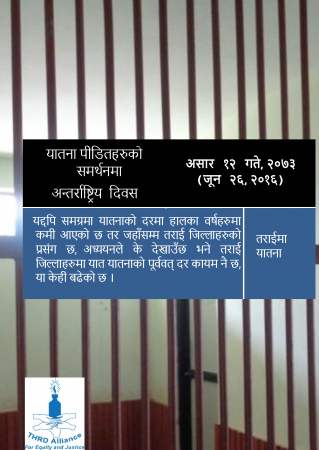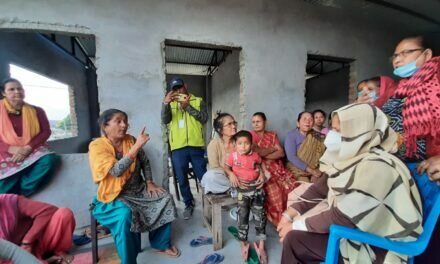THRDA’s analytical study of documented torture based on interviews with detainees at the detention centers across the Terai region of Nepal over the last four months, shows an increasing trend of torture or other cruel, inhuman or degrading treatment of detainees this year.
Although the overall torture trend in Nepal has significantly decreased in recent years, it, however, remains the same or has increased in the Terai districts. Out of a total of 152 detainees interviewed in 19 districts — Jhapa, Morang, Sunsari, Saptari, Siraha, Dhanusha, Mahottari, Sarlahi, Rautahat, Bara, Parsa, Rupandehi, Nawalparasi, Kapilvastu, Bardiya, Banke, Dang, Kailali and Kanchanpur — of Terai region over the last four months (from March to June 2016), 27% (41) reported being subjected to torture or other ill-treatment in detention centres – an increase from 16.7% in 2015. The records show that police in some particular districts in the Terai region — Rupandehi, Dang, Nepalgunj, and Dhanusha especially — have continued to subject detainees to torture to extract confessions.
THRDA also analysed whether or not police followed a number of legal procedures during arrest and after detaining somebody as provisioned in the Constitution of Nepal 2015 and relevant acts.
Conclusion and Recommendations
Article 22, which ensures Right against Torture in the Constitution of Nepal, 2015 stipulates:
(1) No person who is arrested or detained shall be subjected to physical or mental torture or to cruel, inhuman or degrading treatment.
(2) Any mentioned act in clause (1) shall be punishable by law, and any person who is the victim of such treatment shall have the right to obtain compensation in accordance with law.
However, THRDA found that the detainees are still subjected to physical or mental torture an/or to cruel, inhuman or degrading treatment. An end to impunity is necessary to protect human rights. Once police personnel involved in torturing people are punished, the unabated trend of torture will be brought under control. Police should be able to conduct more professional investigations so that they do not feel they have to torture detainees to extract confessions. Only after torture has been criminalized, the problem will come to an end.
Most importantly, passing the proposed Torture or Cruel, Inhuman or Degrading Treatment (Offence and Punishment) Bill tabled in Parliament in August 2014 should be a priority with making some amendments as recommended by human rights institutions. If enacted, it will strengthen legal protections for victims of torture and facilitate in fulfilling Nepal’s international human rights obligations.
तराईमा यातना
यद्दपि समग्रमा यातनाको दरमा हालका वर्षहरुमा कमी आएको छ तर जहाँसम्म तराई जिल्लाहरुको प्रसंग छ, अध्ययनले के देखाउँछ भने तराई जिल्लाहरुमा यातनाको पूर्ववत् दर कायम नै छ, या केही बढेको छ ।
तराईका १९ जिल्लाहरु– झापा, मोरङ, सुनसरी, सप्तरी, सिराहा, धनुषा, महोत्तरी, सर्लाही, रौतहट, बारा, पर्सा, रुपन्देही, नवलपरासी,कपिलवस्तु, वर्दिया, बाँके, दाङ, कैलाली तथा कञ्चनपुर जिल्लामा थर्ड एलायन्सले विगत चार महिनामा १५२ बन्दीहरुसँगको यातनाको बारेमा अन्तर्वार्ताको गरेको थियो, जसमा २७ प्रतिशत अर्थात (४१) ले आफूहरुलाई यातना तथा दुव्र्यवहार गरेको बताए । यो प्रतिशत अघिल्लो वर्षको १६.७ प्रतिशतको तुलनामा निकै बढी रहेको छ । हाम्रो अध्ययनले प्रहरीले खासगरी रुपन्देही, दाङ, नेपालगञ्ज तथा धनुषामा गिरफ्तार गरिएका व्यक्तिहरुलाई अपराध स्वीकार गर्नका लागि यातना दिनेगरेको पाइयो ।
थर्ड एलायन्सले गिरफ्तार गर्नेक्रममा र गिरफ्तार गरिसकेपछि अपनाइनुपर्ने संविधान तथा अन्य कानूनहरुमा उल्लेखित कानूनी प्रक्रियाहरु प्रहरीले पालना गरे नगरेको भन्ने कुराको पनि विश्लेषण गरेको छ ।
निश्कर्ष तथा सिफारिशहरुः
यातना विरुद्धको अधिकार प्रत्याभूत गर्ने नेपालको संविधान, २०७२ को धारा २२ मा उल्लेख छः
(१) गिरफ्तार गरिएको वा बन्दी बनाइएको कुनै पनि व्यक्तिलाई शारीरिक तथा मानसिकरुपमा यातना दिइने वा क्रुर व्यवहार वा अमानवीय व्यवहारवा अमर्यादित व्यवहार गरिने छैन ।
(२) उपधारा १ मा उल्लेख भएका कुनै पनि कार्य कानूनद्वारा दण्डनीय हुनेछ र कुनै व्यक्ति जो यस्तो व्यवहारको शिकार भएको छ, उसलाईकानूनबमोजिम क्षतिपूर्ति पाउने अधिकार हुनेछ ।
थर्ड एलायन्सको प्रतिवेदनले बन्दीहरुलाई अहिले पनि शारीरिक तथा मानसिकरुपमा यातना दिने वा त्रुर, अमानवीय तथा अमर्यादित व्यवहारको शिकार बनाउने गरेको कुरा औंल्याएको छ । मानव अधिकारको रक्षा गर्नको लागि मानव अधिकारको उल्लंघन गर्ने व्यक्तिहरुलाई सजाय दिइनुपर्दछ ।
दण्डहिनताको अन्त्य मानव अधिकारको रक्षाको लागि आवश्यक छ । प्रहरीले अनुसन्धान गर्दा व्यवसायिकरुपमा गर्नु आवश्यक छ । प्रहरीको व्यवसायिक अनुसन्धानले अपराध स्वीकार गराउनका लागि गिरफ्तार गरिएको व्यक्तिहरुलाई यातना दिने, जुन पुरानो प्रवृति छ,त्यसलाई निरुत्साहन गर्नेछ । यातनालाई अपराधको रुपमा पारिभाषित गरको खण्डमा मात्र यातनाको समस्या समाधान हुने देखिन्छ । दुई वर्षअघिदेखि संसदमा विचाराधीन रहेको यातना, अथवा क्रुर, अमानवीय अथवा अमर्यादित व्यवहार (अपराध तथा सजाय) विधेयकमा सामयिक संशोधन गरी पारित गर्ने कुरा सरकारको प्राथमिकतामा पर्नुपर्दछ । यो विधेयक पारित भएको खण्डमा यातना पीडितहरुको हित रक्षाको लागि कानूनी मापदण्डलाई सुदृढ गर्नैछ र त्यसले नेपालको अन्तर्राष्ट्रिय दायित्व पूरा गर्नमा पनि सहयोग गर्ने छ ।







